It’s harvest time!
November 9, 2015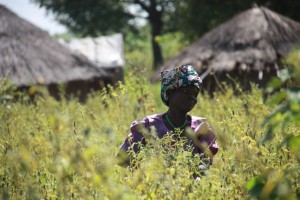 As summer draws to a close, it is time to reap the fruits of the passed months’ labour before the frosts and heavy rains come. Seasons are changing and for farmers all over the world, it is time to harvest
As summer draws to a close, it is time to reap the fruits of the passed months’ labour before the frosts and heavy rains come. Seasons are changing and for farmers all over the world, it is time to harvest
So after months of hard work, care and patience, and overcoming several challenges such as a prolonged draught and stray animals, our 15 SDG groups in Amuru district also gathered to complete their first season harvest.
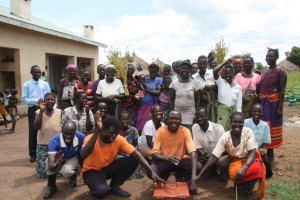 Since the project started in March 2015, eight hundred and thirty seven (837) parents have been coming to our partner schools on a weekly basis to participate, exceeding our outcome target of mobilising 700 parents. After the groups had been established, they chose four types of crops for their school garden and the work began – as well as the training. Groups have now been trained in: good agronomic practices such as site selection, nursery bed operations, seedbed preparation, row planting or integrated pest and disease management (IPM). And they have learnt how to plant, transplant and care for their chosen crops and were finally able to see the first results. While the perennial crops like bananas, pawpaw (papaya), pineapples, jack fruits, passion fruits and citrus will take a bit more time, boxes, tins and sacks were filled with beans, maize, onions & co and put on the market.https://africanrevival.org/wp-admin/post-new.php#
Since the project started in March 2015, eight hundred and thirty seven (837) parents have been coming to our partner schools on a weekly basis to participate, exceeding our outcome target of mobilising 700 parents. After the groups had been established, they chose four types of crops for their school garden and the work began – as well as the training. Groups have now been trained in: good agronomic practices such as site selection, nursery bed operations, seedbed preparation, row planting or integrated pest and disease management (IPM). And they have learnt how to plant, transplant and care for their chosen crops and were finally able to see the first results. While the perennial crops like bananas, pawpaw (papaya), pineapples, jack fruits, passion fruits and citrus will take a bit more time, boxes, tins and sacks were filled with beans, maize, onions & co and put on the market.https://africanrevival.org/wp-admin/post-new.php#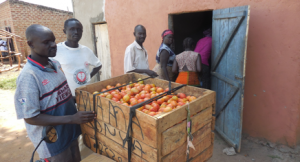 In this respect, each groups’ marketing committee also underwent specific training to acquire valuable marketing skills. The ability to identify lucrative markets and negotiate good prices is decisive in transforming their farming endeavour into a business. Ten SDG groups have already managed to sell their produce at the local markets and earn their first income. Pawel Langeta P/S’s group has even secured their first business deal, as they found a buyer from the border with South Sudan to buy their tomatoes at good price! Soon our participants will be able to generate more income, as they have already started to plant the crops for the second season.
In this respect, each groups’ marketing committee also underwent specific training to acquire valuable marketing skills. The ability to identify lucrative markets and negotiate good prices is decisive in transforming their farming endeavour into a business. Ten SDG groups have already managed to sell their produce at the local markets and earn their first income. Pawel Langeta P/S’s group has even secured their first business deal, as they found a buyer from the border with South Sudan to buy their tomatoes at good price! Soon our participants will be able to generate more income, as they have already started to plant the crops for the second season.
When income is being generated, it is important that money is handled well, which is why parents have also received VSLA training (Village Savings and Loan Association) which instils good financial management, and gives them a platform to begin saving. In addition, the loan system also offers them the opportunity to gain financial capabilities to start their own business.
 Among some of the interesting activities, is the VSLA. It has already instilled a saving culture in us and we believe to become good investors when we save in the future. We are looking at ourselves as future investors and entrepreneurs who can have a big hectares of land and income out of what we have produced.
Among some of the interesting activities, is the VSLA. It has already instilled a saving culture in us and we believe to become good investors when we save in the future. We are looking at ourselves as future investors and entrepreneurs who can have a big hectares of land and income out of what we have produced.
(Lujuro P/S headteacher)
For about 30% of participants, the project is already having a positive impact at home, as they replicate the knowledge and skills learnt. These parents are increasing their production on the household level by, on average, cultivating about 1-2 acres of land each with a variety of crops, such as millet, cassava and vegetables. This again has lead to an increased food security: 69 out of 700 households are food secured (eating 3 meals a day) and many households are eating 2 meals a day hence on fast track of attaining food security. Additionally, following the trainings in nutritious food production and consumption, all parents participating in the SDG are reporting to have a balanced diet consuming vegetables rich in vitamins and essential minerals!
Parents are becoming closer and closer to their schools. At Layima P/S, they have come to recognise the value of education and the necessity of parental support – which is why:
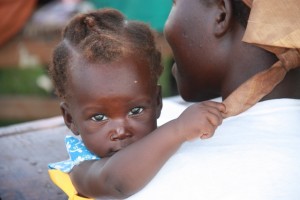 After distributing the 40% of our SDG profit, we will be the first people to pay the school fees, to set a good example to the entire parents. It gives us room to advocate to the other parents to pay their school fees on time.
After distributing the 40% of our SDG profit, we will be the first people to pay the school fees, to set a good example to the entire parents. It gives us room to advocate to the other parents to pay their school fees on time.
(Head of Marketing)
Parents’ reinforced impact is also visible in other areas – for example the number of children with parents providing meals while at school has risen to 5,078 in term III from 3,000 pupils in term I, across the 15 schools. Improvements are also starting to crystallise looking at pupils performance. Although PLE results will only be available next quarter, five schools are already recording improved performances in their termly exams as the number of pupils who passed in DIV I and Div II has increased during term II in comparison to term I. Additionally, there has been a reduction of pupils not taking the exams in four schools, notably in Otong P/S where the number went down from 32 to 4!
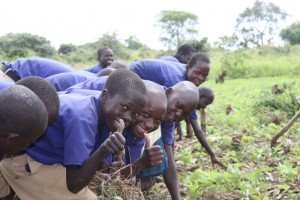 At each school, 50 pupils are also taking part in pupils’ entrepreneurship clubs, which equips them with valuable agricultural and business skills while generating profit to improve their school. Not all pupils will continue with their education after finishing primary school. In this case, the skills acquired in this project will be especially crucial to them. In a total of five schools, pupils were already able to set out for their first harvest and after being trained in valuable marketing skills, are now looking for lucrative opportunities to sell their produce!
At each school, 50 pupils are also taking part in pupils’ entrepreneurship clubs, which equips them with valuable agricultural and business skills while generating profit to improve their school. Not all pupils will continue with their education after finishing primary school. In this case, the skills acquired in this project will be especially crucial to them. In a total of five schools, pupils were already able to set out for their first harvest and after being trained in valuable marketing skills, are now looking for lucrative opportunities to sell their produce!
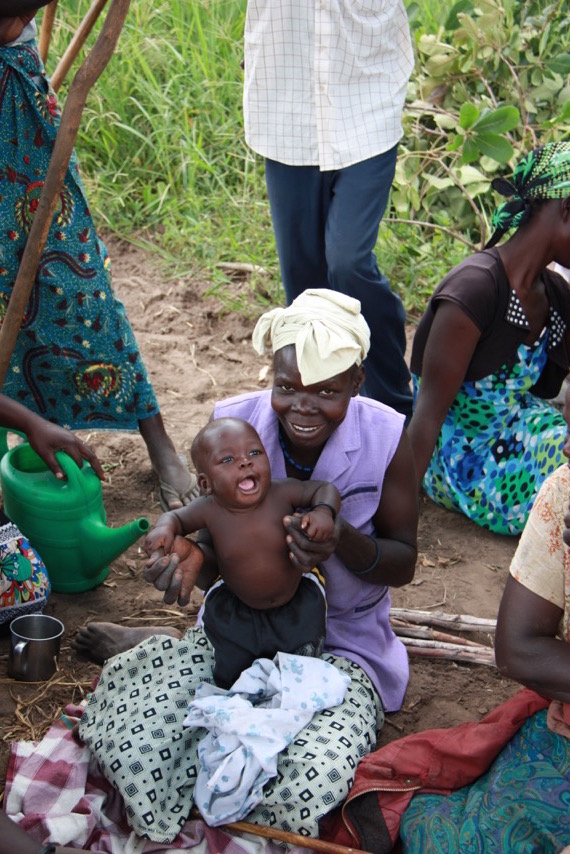 With one harvest completed, new skills and knowledge acquired, and seeds already flourishing in the ground for next season, parents, teachers and pupils are looking confidently and enthusiastically into a prosperous future!
With one harvest completed, new skills and knowledge acquired, and seeds already flourishing in the ground for next season, parents, teachers and pupils are looking confidently and enthusiastically into a prosperous future!
